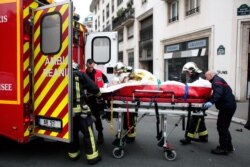Eight years ago, investigative journalist Regina Martínez was found beaten and strangled to death in her home in Veracruz, Mexico. A peerless reporter in the region, she was known for investigating power and corruption, including the state government’s alleged relationship with violent drug cartels. But her death had a chilling effect on journalism in Veracruz.
"It was one of the most brutal and high-profile murders of Mexican journalists in the past 20 or 30 years,” said Jan-Albert Hootsen, the Mexico representative for the Committee to Protect Journalists (CPJ). That’s especially damning, as the press freedom organization notes that “Mexico has long been the most dangerous country for journalists in the Western Hemisphere.”
Martínez’s slaying is the subject of new investigation published this month by “The Cartel Project,” the work of a global network of investigative journalists called Forbidden Stories. Their piece delves into the botched investigation of her death, a social media disinformation campaign about the killing, and the reporting Martínez was pursuing at the time she was killed: “an explosive report on thousands of people who had mysteriously disappeared in Veracruz.”
This is all core to the mission of Forbidden Stories, which founder Laurent Richard described as “continuing the work of journalists who have been killed, jailed or under threat.”
The larger goal, Richard said, is “to send a strong signal to enemies of the free press that even if you kill the messenger you will never kill the message.”
Yet with ongoing violence and impunity for journalist killings in Mexico, as well as anti-press rhetoric from President Andrés Manuel Lopez Obrador, CPJ’s Hootsen acknowledges a harsh reality for reporters in that country: “The situation is pretty bleak.”
More than 30 journalists were killed directly for their work worldwide in 2020, with at least five in Mexico, according to CPJ data. The figure puts Mexico on a par with Afghanistan as the deadliest country in the world for reporters. Worse, these killings are nearly always met with no consequences.
López Obrador and his administration took power in December 2018, promising to quell violence against journalists. Yet as Hootsen said, “That was 20 murders ago, so obviously they failed in that particular commitment.”
The president has acknowledged the importance of journalism and laments the killings. But a comprehensive anti-impunity effort remains elusive, and López Obrador can be hostile to reporters.
The president routinely criticizes news outlets for negative coverage and once told reporters, “If you go too far, you know what will happen.” (López Obrador later said he only meant they’d be held accountable by the public for unfairness.)
Hootsen says that Mexican journalists believe the president contributes to a toxic climate of hate against them online, including harassment, death threats and doxing — where personal details such as addresses are shared online. Government measures designed to protect the media — including a special prosecutor’s office to investigate attacks and safety mechanisms such as bodyguards — are woefully inadequate. At least six journalists under the protection scheme have been slain.
The Mexican Embassy in Washington acknowledged VOA’s request for comment but did not respond to its queries.
Safety in numbers
The lack of effective protection measures is a problem for journalists globally, who often find they are left to face threats alone. Forbidden Stories is trying to counter that through collaboration.
Forbidden Stories was founded in the wake of a high-profile attack on journalists — one that made international headlines. At 11:30 a.m. on Jan. 7, 2015, Richard arrived at the Paris offices of Premières Lignes, the documentary production company where he worked, to discover there had been an attack at another workplace on his floor. Gunmen had killed 12 people and injured several others at the offices of the satirical newspaper Charlie Hebdo.
“I was not in the offices at the time the terrorists attacked, but I was there two minutes after they escaped the building, so I was one of the first in the [Hebdo] newsroom after the killing,” Richard said. “This was a very traumatic event for all of us.”
He decided the best way to protect journalists was for them to work together.
Founded in 2017, Forbidden Stories seeks to connect journalists across the globe in an alliance and for protection, while also demonstrating how their stories are interconnected.
“What we wanted to do with 'The Cartel Project,' " Richard said, “is to show that when a reporter in Mexico is killed it's not only a Mexican story.” After all, drug trafficking in that country has far-reaching implications. The drug cartels have international political connections.
Following leads from Martínez’s work, Forbidden Stories traced the cartels’ reach, including in China, India, the Netherlands and Belgium. The final project consisted of five investigative news articles published simultaneously by media outlets around the world.
It’s a model Forbidden Stories has used to investigate threats to journalists covering environmental issues such as mining; alleged corruption in Ghanaian soccer; and graft in Malta. In all cases, the stories were sparked by deadly attacks or threats against reporters.
Hootsen believes such journalism efforts are important, especially when focused on issues like organized crime or corruption that many Mexican journalists can’t pursue without being targeted.
Part of the problem is it’s often difficult to discern who is behind these killings. “It might be organized crime,” Hootsen said. “It might be some form of local authorities. Or it might be a combination of both. In many areas of Mexico, especially, municipal authorities are so much in cahoots with organized crime or local criminal groups that they're two sides of the same coin."
Many of the journalists singled out for attack are covering the crime beat for a small local outlet without robust funding.
"It's been hard to galvanize support for the issue,” Javier Garza, a Mexican journalist and consultant on media security, told VOA. “We were hopeful that this new president would actually take the issue head on, because a lot of people that worked with him in his campaign and worked with him in his administration were allies of journalists in the fight against impunity and aggressions.”
Even so, Garza said groups like Forbidden Stories and its “Cartel Project” are fighting a noble fight — in Mexico and elsewhere.
“Any initiative that takes the work of a murdered journalist and carries it forward is very positive,” he said, “because it signals to would-be attackers that it is futile to attack the journalist if the work is going to continue."







